In another place and time, Wake Forest’s Call to Conversation might have been an invitation to gather around the crackling campfire under a sky lit by the moon and the stars.
I experienced nights like those a few years ago when I lived for a time in Africa. We would hoist our camp chairs into a circle. We would ladle meat stew cooked over the fire into our bowls and laugh and tell stories as bushbabies — little nocturnal primates with big eyes — jumped from tree to tree, rustling leaves overhead. Those evenings had their share of harrowing tales — did you hear about the local hero who used his Leatherman to unjam the landing gear and saved the Cessna from crashing? — and sorrows, often about another community member felled by H.I.V.
Those nights fed something I didn’t know had been missing — a longing for lost connections and leisurely conversation pierced by laughter, empathy and deep meaning.
This past year, through Wake Forest’s Call to Conversation dinners, I found again what had been lost to me.
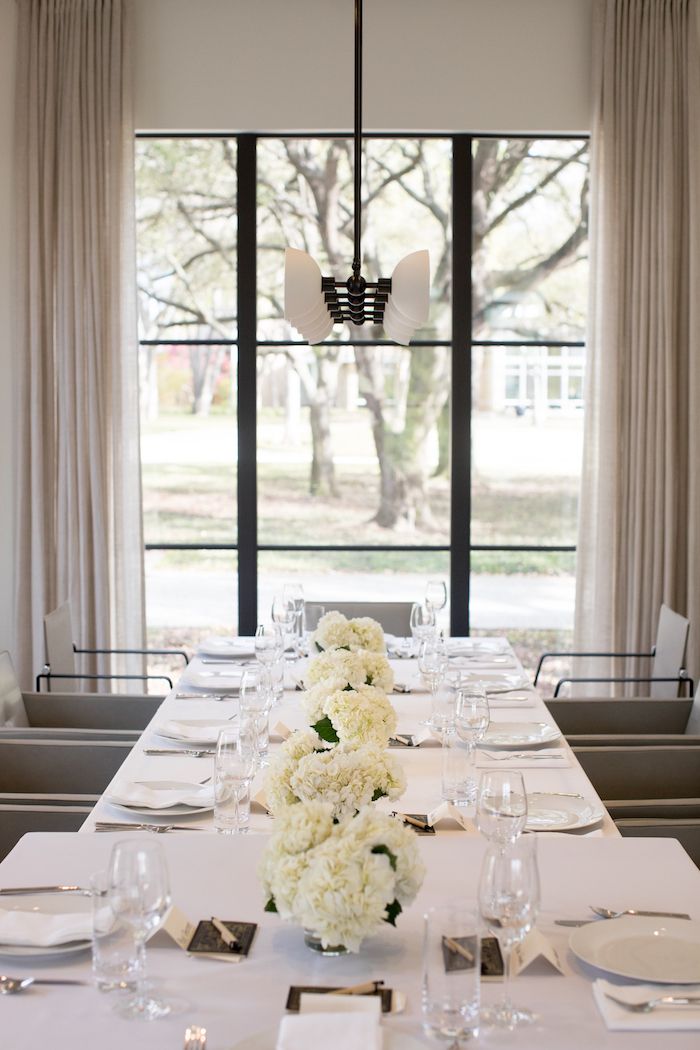
The dinners represent an ambitious effort by the University to spark meaningful conversations. At Wake Forest’s dinners there are no campfires, bushbabies or black cast-iron stew pots over coals — yet. (Just say the word, Wake Foresters in Africa.) In fact, one of the Call to Conversation events I attended in March occurred at the stylish, newly remodeled home of Tyler (Bouldin) Battaglia (’95) and her husband, Blake, in Dallas.
In that setting the essential ingredients for restoring lost connection were as present as anything I had seen under African skies, and I knew it right away, after the 12 participants served themselves at the buffet, took their seats around the dining room table and responded to the prompt from Mark Petersen, vice president of University Advancement.
“There are plenty of opportunities to point out incidents where you witness bad character in action,” Petersen said. “What we’re trying to do is flip that. Most of us have come across someone in our life … who exemplified some of the things you hold dear about good character. We’ll start out by sharing stories, to put out on the table that story for everybody to enjoy.”
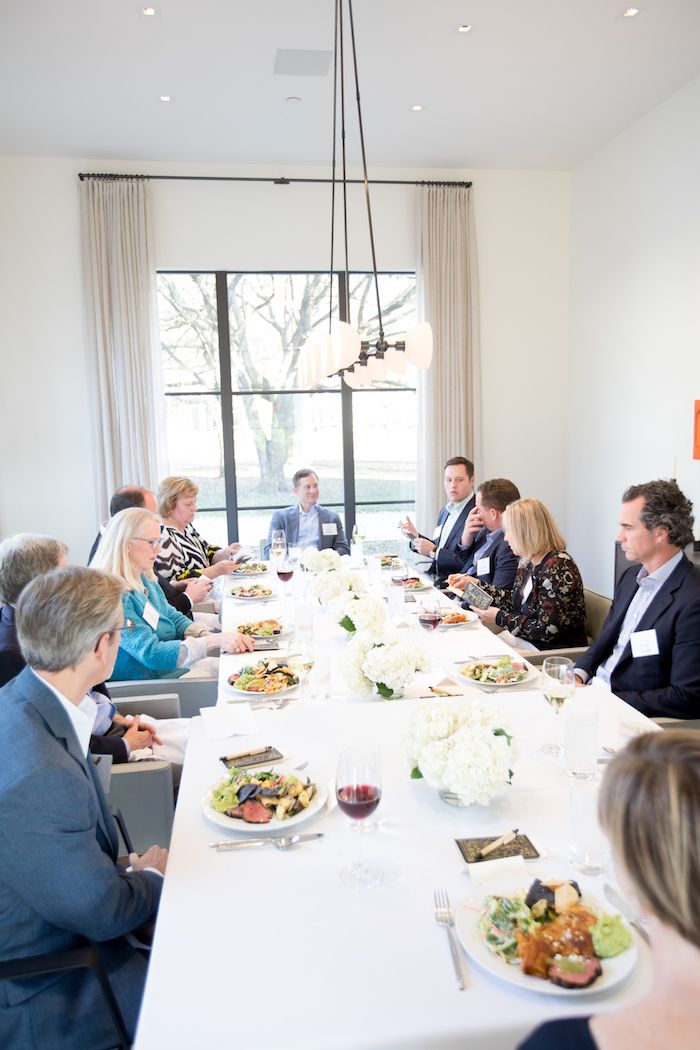
For 30 minutes the diners answered that first prompt, sharing stories about parents, business mentors and memories that had left a mark. Tyler Battaglia talked about the simple habit her parents enforced during her childhood that instilled character. Every night at 6 p.m. the family sat down together “to take time out and sacrifice to be together, even if you didn’t want to be there or had other things to do.”
Jonas Woods (P ’21, ’22) talked about his childhood growing up outside Houston as the son of a rice farmer who “hoodwinked” him. He figured at 9 years old it would be a good trade to plow fields in exchange for his dad’s teaching him to drive a tractor. The fun didn’t last. On summer days when the temperature topped 100 and the humidity was worse, Woods’ friends were swimming or golfing. Woods was plowing.
For 10 years, his father’s summer “program” for him consisted of one week off after school ended and only half-days working the fields when football practice began. Woods went on to Southern Methodist University intending to play football but instead concentrated on academics. He founded Woods Capital, a real-estate investment firm, in 2007.
In college and beyond, he said, “everything seemed physically easy in comparison to those summers on the farm. It really instilled in me a work ethic to this day I probably value as much as any character trait I have. I look back at those summers with my dad and cherish them now — in the rear-view mirror.” (His dad, Woods’ example of good character in this story, is still going strong on the farm in his 80s.)
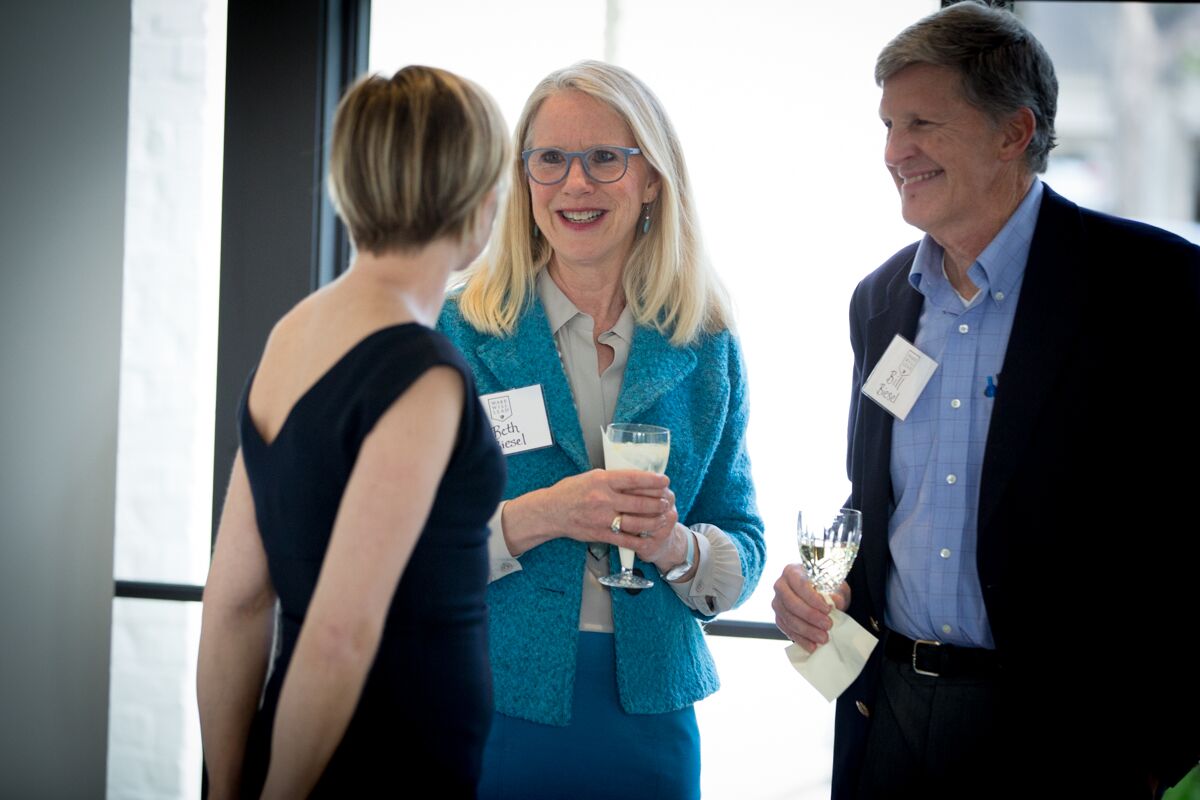
"Be careful what you measure that has nothing to do with the heart," says Beth Biesel (P '18, '20), center. Bill Biesel (P '18, '20), right, says, "It's discouraging sometimes" to see the crisis in leadership. They are talking here with Tyler (Bouldin) Battaglia ('95).
Michael Richmond (P ’22) had a story unlike any other at the table. It had me welling up with tears, which Call to Conversation dinners sometimes do. There’s something about an intimate moment, when someone is willing to expose vulnerability or a treasured memory, that can bring a group of strangers closer and lead one or two to dab their eyes. I carry extra Kleenex.
“I’m from a family.” Richmond paused and took a breath to begin again. “A bartender and a waitress were my parents. Nobody in my family finished high school. I had a teacher in the third grade who could tell I was from a broken home so to speak. … She took me aside and told me education was going to be my way out of my family situation. She impressed upon a third-grader that Stanford had a good medical school, that Harvard had a good medical school. Too many times people do their job and go home. She took me aside to talk about the rest of my life and changed the trajectory of my life.”
Richmond earned a bachelor’s degree in biomedical science, got an MBA and works as an executive for a medical device company.
Doing “that one little thing” can change someone’s life, and you may never know it. That’s leadership, he said, adding, “I’ll never forget Mrs. Diehl, and I wish like heck I knew her first name.”
“Beautiful,” Petersen said almost in a whisper.
The night went on, and by evening’s end these people who arrived as strangers left as friends. They were Wake Forest alumni, parents of Wake Forest students and, in Blake Battaglia’s case, the spouse of an alumna. Wake Forest had brought them together. Their common humanity and willingness to engage in respectful dialogue shaped the evening, creating a distinctive tapestry, woven with stories and emotion. Each dinner over the past year has tended to follow that pattern.
***
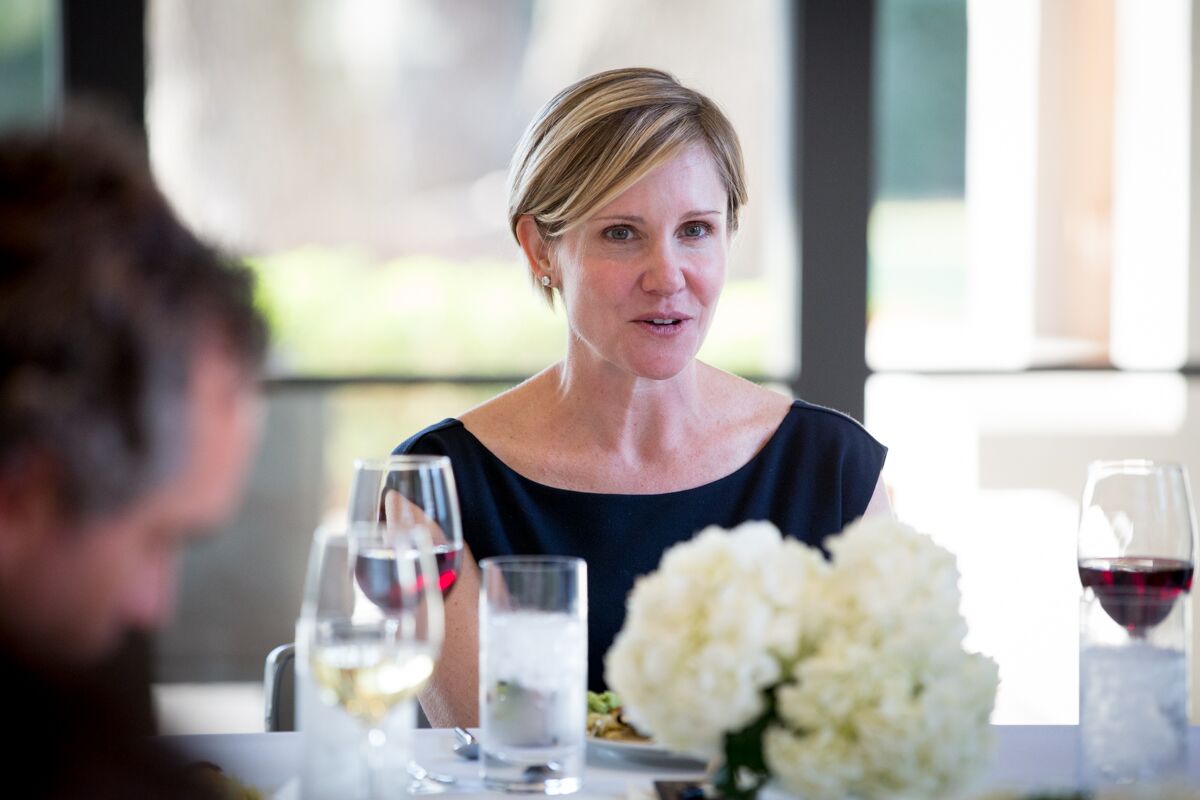
Tyler (Bouldin) Battaglia ('95) says, "We want to come together to talk about our children, about issues, about the world."
The Call to Conversation dinners began in 2017. By May 2018 there had been 100 dinners, most of them focused on the topic of leadership and character, some about careers, others about Pro Humanitate — all antidotes to societal rancor and busy lives that limit community engagement. At the dinners a trained moderator (in Dallas, it was Petersen) guides the group of 10-16 people through a single topic selected in advance. The topics require only a willingness to share, listen and respond. Wake Foresters have been signing up and continue do so online at c2c.wfu.edu to express interest in receiving an invitation to one of the dinners. The University is gathering notes collected across hundreds of conversations in hopes of applying the wisdom to its approach for preparing future leaders.
The initiative, which sounds formal for such warm, homey conversations, is meant to give people a chance to be in community with others. The immediate impacts are new relationships and a stronger community. Long-term, the culture of conversation is expected to be a recognized signature of the Wake Forest experience, something President Nathan Hatch identified as a critical need several years ago.
Hatch could see how connected people were in their digital networks but how face-to-face conversation and engagement were waning. He addressed this concern in his 2012 Commencement speech, “The Art of Conversation.”
Hatch told graduates and their families we live “in a marvelous, almost magical age of connection.” Magical devices connect us digitally and allow control over our exchanges, but he wondered, “When the chips are down, who really knows and cares for us?” He warned we are at risk of losing the art of conversation on which friendship and community depend.
Real conversation, he said, “is a deeply moral act, an act of character, because it means I go beyond myself to be interested in my friend or to explore the views and feelings of someone I may not understand.” He urged the Commencement audience to go forth and nurture the art of conversation: “Engage people around you; look them in the eye; and give them your heartfelt attention.”
The Call to Conversation dinners provide occasions to do all of those things. The comments jotted down by participants after the dinners attest to the value. “We need more opportunities to exchange ideas in these very divisive times,” wrote one of the participants after a dinner in Wilmington, North Carolina. “Wonderful to have a conversation with smart, thoughtful friends,” said a participant in San Francisco. “I wish others would take to heart the importance of listening, regardless of agreeing vs. disagreeing, to understand one another,” said a participant in Washington, D.C.
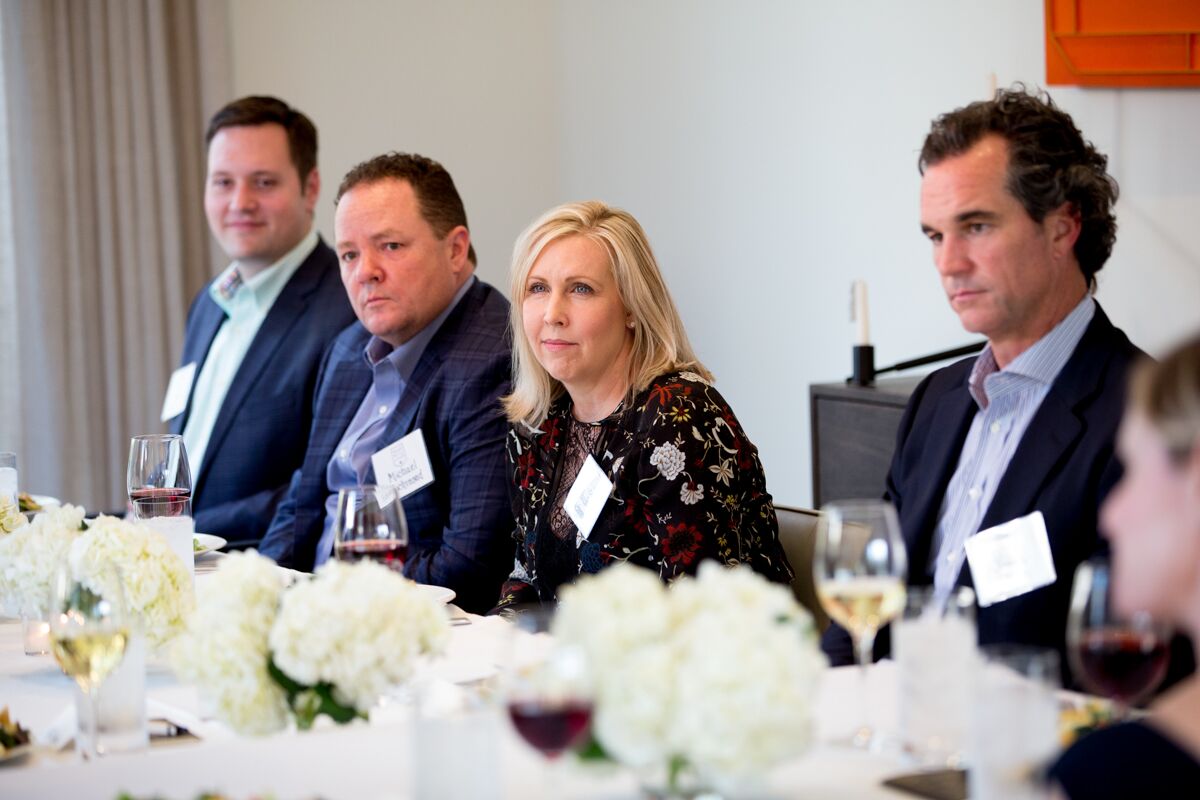
The Battaglias' guests were told, "The conversation will be free-flowing." From left, John Turner ('12), Michael and Paula Richmond (P '22) and Jonas Woods (P '21, '22).
I talked with Tyler Battaglia a week after the Dallas dinner to get her take on the evening. She admitted she had been nervous beforehand but quickly settled in to enjoy hosting the event. “I didn’t know anyone coming into our home. … We were able to jump in not knowing one another and feel like we were old colleagues, sharing our ideas and experiences and thoughts. I thought it was wonderful.”
Mike Lakusta (’79) was there that night with his wife, Anne (Hauser) Lakusta (’81) and liked the leadership and character topic. “Anne and I think that dialogue is really missing in America right now,” he said. “Dialogue is critical. We’re proud that our university is doing it. It needs to permeate America.”
I found it noteworthy that participants I interviewed and those who wrote reflections on little note cards the University provided grasped an important aspect of the Call to Conversation dinners. The dinners were not discussions. They were not meant for brainstorming and hashing over solutions, pro or con. They were not for the purpose of critiquing the University for good or ill. Instead, they were occasions for dialogue, which is something very different.
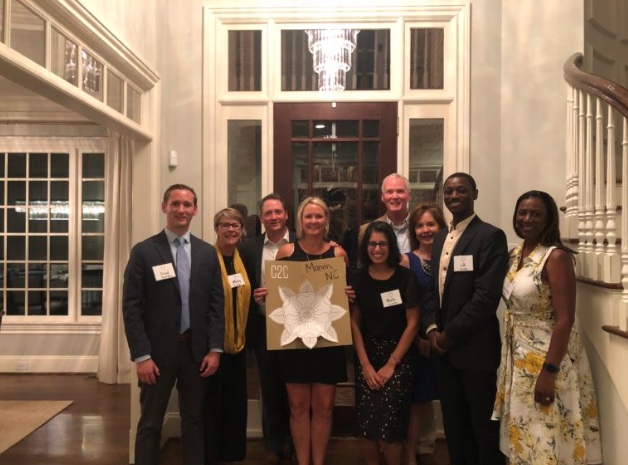
Each Call to Conversation dinner, such as this one in Marvin, North Carolina, includes a group photo of those attending.
William Isaacs wrote a book about the subject, “Dialogue and the Art of Thinking Together.” I remembered it and pulled it off my shelf after my trip to Dallas. Isaacs defines dialogue as “a shared inquiry, a way of thinking and reflecting together, … a living experience of inquiry within and between people.”
In a nod to religious philosopher Martin Buber, Isaacs writes, “Seized by elemental togetherness, we touch the genuine power of dialogue, and magic unfolds.”
As a witness to the dinners, I watched the magic unfold. I will remember the respect strangers showed to one another, how everyone got a chance to speak, how deeply attentive people were in listening to their dinner companions. These were no ordinary dinner parties. These were occasions for personal and community insight.
I was reminded of the words of the author Brenda Ueland when I reflected on how the participants I encountered “listened with affection,” without arguing, changing the subject or, as she puts it, “pressing their mind” against the speaker’s mind. “When we are listened to, it creates us, makes us unfold and expand,” she writes. “When we listen to people there is an alternating current, and this recharges us so that we never get tired of each other. We are constantly being re-created.”
Dialogue and deep listening. They are the ingredients of an oral tradition from ancient days that remains relevant in this, our modern age of communicating on devices and watching in dismay when leaders shout at each other on television. Our coming together around a dinner table for face-to-face engagement matters. Our shared humanity and storytelling matter. They help us bridge divisions and strengthen communal bonds. They foster new understanding. Above all, they help us make meaning in our lives, and that’s worth talking about.
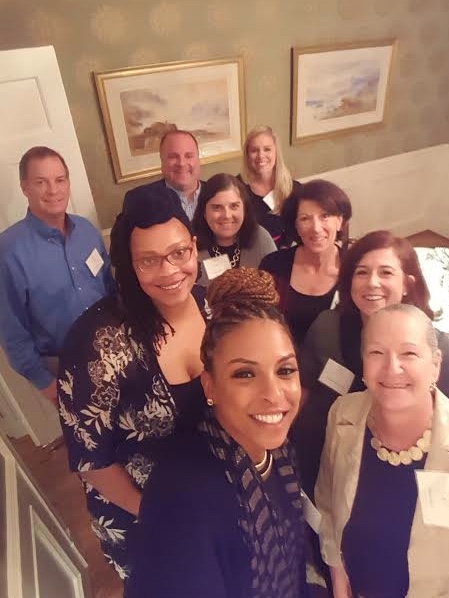
A group photo from a Call to Conversation dinner in Atlanta.
What is Wake Forest’s Call to Conversation?
A national movement with one goal — to spark more meaningful conversations.
Why this movement?
Nationally there’s a hunger for connection. For a place like Wake Forest, conversation is at the heart of what we do because it combines ideas and human interaction, the intellectual and the personal.
How does the Call to Conversation work?
A trained moderator guides a group of 10-16 people through a meaningful conversation on a topic selected in advance. The conversations take place over dinners hosted by a Wake Forester. The dinners have ranged from formal to casual, from back porches to family rooms to office conference rooms — even to a church fellowship hall — with food ranging from catered fare to a summer supper with homemade corn casserole and tomatoes fresh off the vine. Participants quickly get to know each other and form community as they share personal experiences and ideas related to the topic.
How do I attend or host a Call to Conversation?
Provide your contact information at https://c2c.wfu.edu. This helps the University prioritize cities moderators will visit first. To host your own Call to Conversation, provide the contact information and stay tuned. As the process for planning, executing and follow up is completed, the University expects to make available the guides used by hosts and moderators.
How did it go?
The following remarks are from participants of Call to Conversation dinners who anonymously filled out cards of advice to future participants.
Wilmington, North Carolina
“Conversations will intro you to a lot of folks with great stories — stories of values, leadership, love, laughter.”
“We need more opportunities to exchange ideas in these very divisive times.”
Houston
“It will uplift your spirit. It is an important conversation to elevate our community and the thoughts of our children. Be a part, please.”
“Is there anything more necessary (and valued) than community? We need it, we value it, we are motivated by it — and tonight added to my ‘circle,’ my community. … I am called to carry this forward.”
University Board of Trustees dinner, Winston-Salem
“That the building of character is a function of the strength of community, and community is that thing that Wake Forest does best.”
“Collective soul!”
Nashville, Tennessee
“Unlike any other university or alumni experience — rich in conversation and thought but simple in idea. Can’t wait to try something similar on our own!”
Charlotte, North Carolina
“An opportunity to think deeply and sit with the power and presence of another’s experience.”
“A dinner that turns from an artificial conversation to family discourse.”
Charleston, West Virginia
“This is not a test! A roundtable discussion of common experiences. Friendly, engaging, FUN!”
New York City
“An incredibly refreshing open conversation with points of view you rarely get to hear.”
Washington, D.C.
“I wish others would take to heart the importance of listening, regardless of agreeing vs. disagreeing, to understand one another.
Greenwich, Connecticut
“We have more in common than you think. We all want the best for the future. Understand you are the future.”
“A wonderful opportunity to speak about important things with people who start as strangers and quickly feel like friends. Go Deacs!”
San Francisco
“Wonderful to have a civilized conversation with smart, thoughtful ‘friends.’”
Lancaster, Pennsylvania
“Nothing to be afraid of. Go enjoy!! You won’t regret it.”


